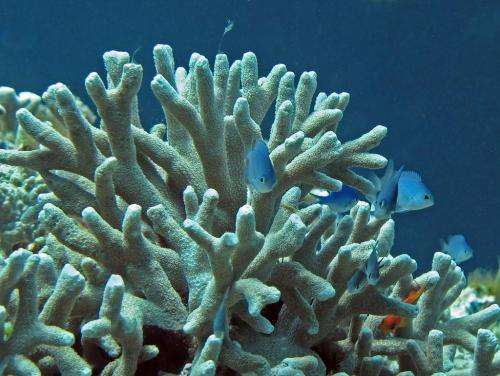Coral's durability to acidification examined

An international team of coral biologists has been examining coral's ability to colonise new substrates and repair damaged reefs as oceans become more acidic.
UWA post-doctoral fellow Michael Holcomb says it would tend to be more difficult for new larvae to establish themselves, fragments of coral to bond to new substrates, and damaged coral to regrow.
"It's important to understand how they control their internal environment where calcification actually occurs," he says.
"The study was intended to evaluate how well they are able to control the internal pH in different locations where they calcify."
They studied the branching coral Stylophora pistillata which is endemic to the Indian and west Pacific Oceans.
Dr Holcomb says they examined several locations within the coral itself, from its outer edge as it grows over new substrate to its apical growing region.
They found the coral, once established, is able to control its own pH levels.
"Where there's a thick tissue layer, the coral's better able to control the pH in that environment and also the calcification rate is less affected by acidification," he says.
"Whereas in the new growth forming over substrate they are less able to control the pH in this environment, it's more strongly affected by the external environment and calcification responds similarly."
pH levels based on proton pumping
He says coral's ability to regulate pH levels is thought to be based on proton pumping.
"They're pumping protons out of the calcifying environment to elevate the pH…in that internal environment," he says.
The team grew corals at the Centre Scientifique de Monaco, where Dr Holcomb had previously worked.
"They were grown for a few months on glass slides under a range of CO2 levels ranging from ambient conditions to about 10 times ambient CO2 levels," he says.
"Then we sampled the skeleton, a couple different sites, and then estimated pH by using a technique based on boron measurements."
Dr Holcomb says using the facilities of both institutions enabled them to subject the same samples to boron measurement at UWA and physiological measurement at the Monaco-based centre.
He says increasing oceanic acidity, concurrent with rising atmospheric CO2 levels, could prove challenging for corals.
"There are certain stages of growth which are likely more sensitive to acidification—namely things like the larvae and their initial colonisation of the substrate," he says.
"It's going to affect more their ability to compete with other organisms if they're less able to isolate that substrate."
More information: "Coral calcifying fluid pH dictates response to ocean acidification." M. Holcomb, et al. Scientific Reports 4, Article number: 5207 DOI: 10.1038/srep05207. Received 15 January 2014 Accepted 19 May 2014 Published 06 June 2014
Journal information: Scientific Reports
Provided by Science Network WA

















